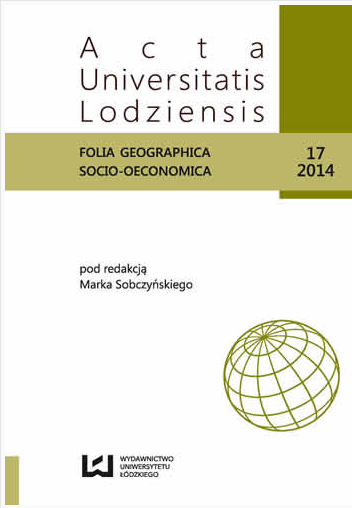Struktura narodowościowa Polski w badaniach geograficznych
The ethnic structure of Poland in geographical research
Author(s): Marek BarwińskiSubject(s): Social Sciences, Geography, Regional studies, Human Geography, Sociology
Published by: Wydawnictwo Uniwersytetu Łódzkiego
Keywords: national minorities; ethnic minorities; ethnic structure of Poland
Summary/Abstract: The issue of ethnicity is interdisciplinary and tackled by many sciences such as history, statistics, demography, politology, sociology, ethnology or ethnography, as well as geography, which focuses primarily on the spatial element of distribution of ethni-cities, the causes and consequences of its changes and the genesis of concentrations of ethnic minorities. As part of population geography or, more broadly, anthropogeography, and apart from geographies of religion and languages, there is a discipline called geography of ethnicity, which studies the numerousness, as well as assesses and analyses the ethnic structures in various spatial scales. Studies of ethnic structures and their transformations are common especially in political geography, which devotes more place to the issues of ethnic, linguistic and religious minorities than any other geographical science. Owing to its ability to study the spatial and temporal context of various phenomena, it facilitates the recognition and comprehension of interrelations between political, demographic, social and cultural factors. Such studies are particularly justified in the case of clear dependence between ethnic transformations and territorial or political transitions, i.e. the elements within political geography's scope of interest. Studies concerning ethnic minorities in Polish geography have had a long research tradition and great scientific achievements, especially in the interwar period and the last twenty years. These studies, though episodic in Communist times, have seen a contemporary renaissance. When dealing with issues of ethnicity, geography uses the achievements of other disciplines, especially history, statistics, sociology, and political science. The main point of reference in any analyses of the ethnic specifics is space, geographical environment and the socio-economic circumstances, while also considering the influence of historical and political conditions. Close links between political and historical geography caused by both disciplines studying the natural variability over time and space allow for referencing the socio-historical context which is indispensable in this kind of research. The vast majority of national, ethnic and regional minorities living in contemporary Poland are a part of the historical, cultural and political heritage of Poland, a testament to the former complexity and multicultural character of Poland, a part of its history, present day and, hopefully, its future. These minorities, even though thought of as “different” and separate in regards to their national, linguistic or religious identity are “at home”, with all rights and obligations that entails. Therefore, further research into the ethnic structure of Poland in essential, mainly due to the dynamic changes the country is currently undergoing (quantitative, qualitative, territorial, institutional, cultural, social, political), the growing importance of native regional groups and nationalities stemming from the non-European cultures, as well as the geopolitical, economic and civilisation transformations that are changing Europe.
Journal: Acta Universitatis Lodziensis. Folia Geographica Socio-Oeconomica
- Issue Year: 17/2014
- Issue No: 2
- Page Range: 113-146
- Page Count: 34
- Language: Polish

